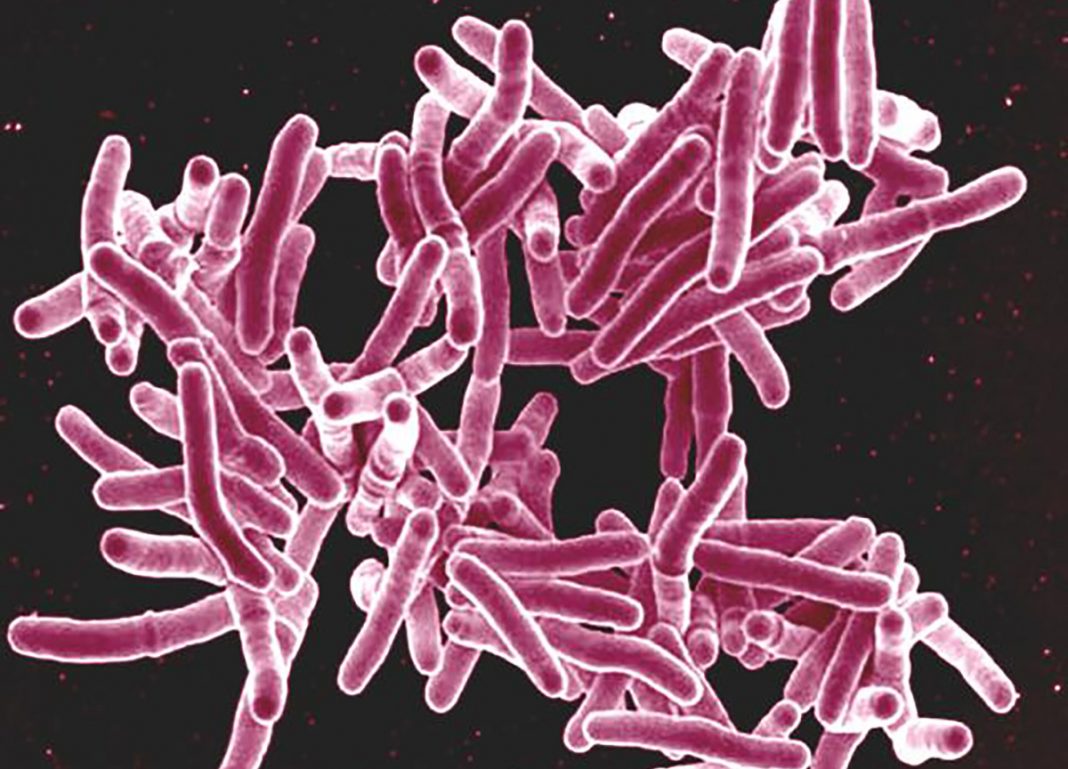Scientists at the Rutgers New Jersey Medical School (NJMS) have found a genetically tractable cause of drug-tolerant tuberculosis (TB), which could pave the way for researchers to develop new drugs to combat the global TB epidemic and cure the disease. The study (“Phase variation in Mycobacterium tuberculosis glpK produces transiently heritable drug tolerance”), led by Hassan Safi, PhD, assistant professor of medicine, and David Alland, MD, professor and chief of infectious disease in the department of medicine at NJMS, appears in PNAS.
Tuberculosis is the leading cause of death from an infectious disease worldwide. One-fourth of the world’s population is currently infected with TB, and at least 1.3 million people died from the disease in 2017 alone, according to data from the CDC.
This new research study reveals that reversible mutations in the M. tuberculosis glpK gene, a gene responsible for an important metabolic pathway, produce a reversible form of tolerance to most of the first-line drugs used to treat TB.
“The length and complexity of tuberculosis (TB) therapy, as well as the propensity of Mycobacterium tuberculosis to develop drug resistance, are major barriers to global TB control efforts. M. tuberculosis is known to have the ability to enter into a drug-tolerant state, which may explain many of these impediments to TB treatment. We have identified a mechanism of genetically encoded but rapidly reversible drug tolerance in M. tuberculosis caused by transient frameshift mutations in a homopolymeric tract (HT) of 7 cytosines (7C) in the glpK gene. Inactivating frameshift mutations associated with the 7C HT in glpK produce small colonies that exhibit heritable multidrug increases in minimal inhibitory concentrations and decreases in drug-dependent killing; however, reversion back to a fully drug-susceptible large-colony phenotype occurs rapidly through the introduction of additional insertions or deletions in the same glpK HT region,” the investigators wrote.
“These reversible frameshift mutations in the 7C HT of M. tuberculosis glpK occur in clinical isolates, accumulate in M. tuberculosis-infected mice with further accumulation during drug treatment, and exhibit a reversible transcriptional profile including induction of dosR and sigH and repression of kstR regulons, similar to that observed in other in vitro models of M. tuberculosis tolerance. These results suggest that GlpK phase variation may contribute to drug tolerance, treatment failure, and relapse in human TB. Drugs effective against phase-variant M. tuberculosis may hasten TB treatment and improve cure rates.”
“By discovering these mutants, we have pin-pointed a genetically tractable cause of drug tolerance, and as a result, we now have a unique opportunity to develop and test new treatments that are effective against drug-tolerant organisms, which could lead to more rapid and effective therapies for tuberculosis,” said Alland.
The study also shows that drug-tolerant organisms accumulate during TB infection and accumulate even more rapidly with TB treatment. This form of drug tolerance can explain the high rates of treatment failure and relapse which occur in this disease unless it is treated for at least six months.
The rapidly reversible nature of these mutations produces a transient form of drug tolerance that appears to disappear after the pressure of drug treatment is withdrawn. This unusual behavior likely explains why this drug tolerance mechanism has not been discovered previously.
Despite decades of efforts to stem the tide of contagion, the length and complexity of TB therapy continue to present major barriers to global control efforts.
For example, most cases of TB must be treated for six months and relapses are fairly common. In fact, about 20% of patients with drug susceptible TB will experience a relapse if treated for less than six months and approximately 5% will relapse even when treated for a full six months.
Drug resistance is fixed within the TB bacterium’s genetic code, but any case of TB, even cases that were previously deemed drug susceptible, can become drug tolerant by reversible mutations in the glpK gene, according to the researchers.
Scientists believe drug tolerance stems from TB’s ability to lie dormant in the host’s immune system. This biological change allows the disease to adapt to its environment and ultimately becomes transiently resistant to traditional therapies.
Alland and his team set out to study this phenomenon and in doing so, they discovered a new mechanism of drug tolerance caused by genetically coded, but rapidly reversable mutations in the Mycobacterium tuberculosis bacteria that could be used to develop drugs that can quickly and effectively cure drug-resistant TB.
According to this research, drugs that are effective against phase-variant M. tuberculosis can hasten TB treatment and improve cure rates.
“Because of this study, we now have the ability to track and manipulate genetic mutations so that they have the same characteristics as drug-tolerant cases of tuberculosis. That’s never been done before,” explained Alland. “If we are going to defeat this disease, we need to find effective treatments for drug-tolerant TB, and we need to do it now.”






